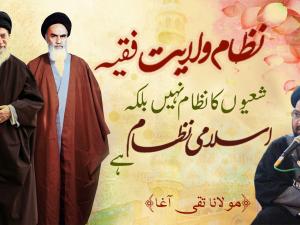Short Description
What is Wilayet e Faqih? I remember a conversation with a young Iranian scholar almost thirty years ago.
What is Wilayet e Faqih? I remember a conversation with a young Iranian scholar almost thirty years ago. “The Sunnis live in a house that has no roof and no furniture”, he said at the end of a long discussion, “whereas, the Shias live in a house that not only has a roof but is embellished with furniture”. There you have it, the understanding of Wilayet at the operational level. The words Wilayet and Faqih have different meanings in the Sunni and Shia schools, and there are differences of opinion even within each of the Sunnah and Shia schools. We will avoid our own opinions here and present the ideas as advanced by Khomeini. The quotes are taken from Islam and Revolution, Writings and Declarations of Imam Khomeini, by Hamid Algar, Mizan Press, Berkely, CA. 1981.
The idea of Wilayet e Faqih did not originate with Khomeini. In the cited reference, Khomeini states: “The subject of governance of the faqih is not something new that I have invented; since the very beginning, it has been mentioned continually”. He offers the rulings given by Mirza Hasan Shirazi prohibiting the use of tobacco during the tobacco revolution of 1906 as an example of guidance offered by a faqih which all other fuqaha were obliged to follow. Khomein continues: “The late Kashif al-Ghita expounded much of what I have said. The late Naraqil also was of the opinion that the fuqaha are entitled to exercise all the worldly functions of the Most Noble Messenger. “
Throughout Islamic history, scholars, kings and conquerors have sought validation for their ideas and their actions in the Qur’an and the example of the Prophet. As an example, the intellectual storms that overwhelmed the Islamic world in the eighth century CE following the eruption of the Mutazalites were fought on the basis of the Qur’an. The Mutazalites as well as the anti-Mutazalites, the philosophers as well as the traditionalists, all sought their justification for their views from the Qur’an. The idea of Wilayet e Faqih is no exception to this rule. It is here that we have search for its roots and its foundation.
Great ideas transform nations and guide them towards their destiny. When they are applied in the matrix of human affairs, they are necessarily compromised to reflect the cultural norms of a people and accommodate human frailties. It is like rain water. When it falls from the heavens, it is pure and brings with it the Grace of God. Before it gives life to a dead earth and transforms a desolate landscape into lush gardens, it must necessarily create gushing, muddy rivers which cause havoc in the land.
The ideas that animated the Islamic world in the twentieth century, those of Zia Gokulp, Allama Iqbal, Dr. Ali Shariati, Maulana Maududi, Hassan al Banna, and yes, Imam Khomeini are no exception to this rule. Each one of these ideas held out the promise of a better world when it was nascent. When it was applied, it was muddied, compromised and often scuttled or abandoned.
Each of these ideas sought its justification in the Qur’an and the Sunnah of the Prophet. Expressed another way, no idea that cannot be traced to the Qur’an and the Sunnah of the Prophet has a chance of survival in the Islamic body politic. But when you study these ideas in depth and examine their relationship to the revealed Word, you will find that the human ideas were in themselves a reflection of the interpretations of their authors. The revealed Word, like a diamond with infinite cuts, reflects light in many directions, and lends itself to multiple interpretations. That is the beauty and majesty of the Qur’an. It reflects light no matter where you stand.
It offers guidance whether you are in the East or the West, North or the South, whether you are a liberal or a conservative, a modernist or a traditionalist, a scholar or an illiterate, a minority or a majority, a Sufi or a Salafi, a Bedouin or a city dweller, living in the eighth century or in the twenty first century. It is for this reason that our ulema have said that Ijtihad is a continuous, unceasing process. Each generation must rediscover for itself what its existential destiny is through a process of rigorous, continuous, unceasing struggle and apply Divine guidance to its own lives. Muslims, who constitute one quarter of the human race, live in different cultures and have a myriad of historical experiences.
The unity that the Muslims seek cannot be political unity; it is unity of purpose, a unity of vision, and a unity of a shared struggle with mutual support. One shoe does not fit all.
Wilayet e faqih was one such idea. It was an idea that Khomeini deftly used to topple one of the most entrenched monarchies which was backed by the awesome might of a superpower. In the process he changed the political map of the Middle East and launched Iran into the turbulent waters of clerical rule.
stay tuned..........






![نصيحتي لك: اذكر الله [1 / 12] نصيحتي لك: اذكر الله [1 / 12]](http://97.105.52.213/images/upload/content_thumbs/1913613138ragheb-al-serjany-videos.jpg)


Comments
Send your comment